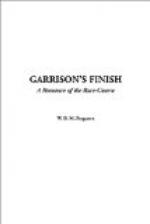Yes, the signals were set dead against him. His opinion of Crimmins had undergone a complete revolution; first engendered by the trainer offering him a dishonorable opportunity of fleecing the New York pool-rooms; now culminated by his indirect charge.
Garrison considered the issue paramount. He was furious, though so seemingly indifferent. Every ounce of resentment in his nature had been focused to the burning-point. Now he would not leave New York. Come what might, he would stand his ground. He would not run away. He would fight the charge; fight Waterbury, Crimmins—the world, if necessary. And mingled with the warp and woof of this resolve was another; one that he determined would comprise the color-scheme of his future existence; he would ferret out the slayer of Sis; not merely for his own vindication, but for hers. He regarded her slayer as a murderer, for to him Sis had been more than human.
Garrison came to himself by hearing his name mentioned. Behind him two young men were seated at a table, evidently unaware of his identity, for they were exchanging their separate views on the running of the Carter Handicap and the subsequent poisoning of the favorite.
“And I say,” concluded the one whose nasal twang bespoke the New Englander; “I say that it was a dirty race all through.”
“One paper hints that the stable was in on it; wanted to hit the bookies hard,” put in his companion diffidently.
“No,” argued the wise one, some alcohol and venom in his syllables, “Waterbury’s all right. He’s a square sport. I know. I ought to know, for I’ve got inside information. A friend of mine has a cousin who’s married to the brother of a friend of Waterbury’s aunt’s half-sister. So I ought to know. Take it from me,” added this Bureau of Inside Information, beating the table with an insistent fist; “it was a put-up job of Garrison’s. I’ll bet he made a mint on it. All these jockeys are crooked. I may be from Little Falls, but I know. You can’t fool me. I’ve been following Garrison’s record—”
“Then what did you bet on him for?” asked his companion mildly.
“Because I thought he might ride straight for once. And being up on Sis, I thought he couldn’t help but win. And so I plunged—heavy. And now, by Heck! ten dollars gone, and I’m mad; mad clear through. Sis was a corker, and ought to have had the race. I read all about her in the Little Falls Daily Banner. I’d just like to lay hands on that Garrison—a miserable little whelp; that’s what he is. He ought to have poisoned himself instead of the horse. I hope Waterbury’ll do him up. I’ll see him about it.”
Garrison slowly rose, his face white, eyes smoldering. The devil was running riot through him. His resentment had passed from the apathetic stage to the fighting. So this was the world’s opinion of him! Not only the world, but miserable wastrels of sports who “plunged heavy” with ten dollars! His name was to be bandied in their unclean mouths! He, Billy Garrison, former premier jockey, branded as a thing beyond redemption! He did not care what might happen, but he would kill that lie here and now. He was glad of the opportunity; hungry to let loose some of the resentment seething within him.




